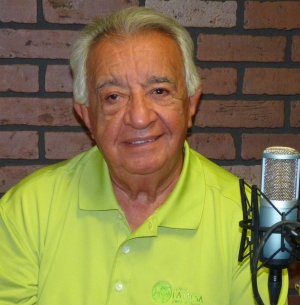
Hear our interview with La Mesa Mayor Art Madrid, originally broadcast on KNSJ radio: https://www.eastcountymagazine.org/sites/eastcountymagazine.org/files/au...
By Miriam Raftery
October 16, 2014 (La Mesa)—La Mesa Mayor Art Madrid has been serving the city for the past 33 years, as Mayor since 1990 and on the Council before that since 1981. He led the city through its centennial celebration and has held numerous other leadership positions including chair of the San Diego Association of Governments, president of the League of California Cities San Diego Division, and as a member of 125 different boards and commissions.
In an in-depth radio interview on the East County Magazine Show on KSNJ, Mayor Madrid discussed his history of accomplishments, his views on leaderships, and his vision for La Mesa for the future if reelected. To read highlights of our interview, click "read more" and scroll down.
We also invited the Mayor’s opponent, Councilman Arapostathis, who declined to do a radio interview or to debate Mayor Madrid, but did sit down for an interview for our news website which can be read here.
Asked to name his most significant accomplishments and strengths, Mayor Madrid lists “tangible” accomplishments that include building new public buildings including a new library, fire station, post office and police department headquarters. “Our infrastructure is in great shape, and our streets and roads are well maintained,” he adds. “More importantly though I believe in giving access to residents, and to that degree I’ve initiative six new boards and commissions since I became mayor and we have the community involvement-- it’s called civic engagement. We have a number of volunteers who through the years have saved the citizens about $15 million.”
We also asked how Mayor Madrid defines leadership.
. “The role of the mayor is the chief elected official of the city; in my capacity as mayor we do all the official documentation and signing but more importantly we represent the city in every kind of activities,” he says, adding that leadership is “based on assessing what the public wants to hear and more importantly, addressing key issues that the public is concerned about. So leadership is being able to listen, to respond in a timely fashion, to collaborate, and to make sure that you can compromise … because it becomes a better community when you do those things.”
A key issue in this race is the time that each candidate will put into the job, since Councilman Arapostathis is a full-time teacher who also heads up two junior theater programs in the community. So we asked Mayor Madrid how many hours he works as Mayor each week and whether it’s realistic to believe the job can be done in fewer hours.
He replied, “Candidly it’s labeled as a part time job, but if you really want to be efficient and effective and provide some leadership and some programs for the citizens of La Mesa, it really is a full time job. I probably average about 60 to 70 hours a week. That includes the weekends and going to events and functions.” He adds that each weekend, he makes it a point to drive through at least as quarter of La Mesa “to see just exactly what needs to be done.” He believes that a Mayor needs to “make sure that you are there taking care of the needs of the people. It’s difficult to say that it’s a part-time job, because I average 35 to 41 calls or visits from citizens on a monthly basis who want to address a specific issues.”
Accessibility is another issue in the race. Mayor Madrid hands out business cards with his cell phone. Arapostathatis’ campaign website has no contact information, except for donors. (He has said this is an oversight that he intends to correct.)
Asked about accessibility, Mayor Madrid replies, “One of the biggest concerns that the public has is that they can’t get hold of their public officials once they get elected.” By contrast, Madrid says, “I make it a point to be accessible because I asked for their support and I’m now responding to their needs.The issue of accessibility is probably the most important thing that we have to offer as public officials so it’s important that we make sure everybody has access to us, by dropping by at city hall, or calling us on our cell phone or even on our home phone, or even I’ve had people drop by my neighborhood and knock on the door and start sharing some concerns and we listen to them and take action.”
The La Mesa Council has sought to cut funding recently for the Mayor to attend events outside the region, such as meetings of the League of California Cities and the National Conference of Mayors. So we asked the candidates if they hope to attend these outside meetings or believe that such matters can be handled by staff or via Skype or phone.
Madrid was firm. “As an elected official it’s your responsibility to represent your city. There are a number of national, civic and regional organizations where it’s critical that we have representation. It’s called best practices….You interact with other elected officials. We all basically have the same challenges in our respective cities…You dialogue and ask them how they address those issues, come back with ideas and thoughts that you pass on to staff and they go ahead and act on those.”
The Mayor believes the idea of replacing in-person meetings with conversations by phone or Skype is “superficial.” He states, “When you’re at these meetings, you have to sit down and have dialogues with your colleagues and peers from throughout the country.”
Redevelopment and infill are important issues facing La Mesa, such as the controversy over the proposed Park Station high-rise. La Mesa has already seen some redevelopment with new public buildings and the downtown streetscape project now underway. So we asked the Mayor for his definition of “smart growth” and how that should fitin with the city, downtown village and La Mesa’s historical character.
“Let me add some historic perspective,” says the Mayor, who notes that land along Fletcher Parkway formerly occupied by Quonset huts and a brickyard now have Costco, other large retailers and restaurants. “That place used to be under-developed and under-utilized,” he said, recalling that the only crossing for motorists was a railroad car laid on its side as a makeshift bridge. “I took the leadership to make sure that we made that an economic viable program for the city.”
As for the future, he believes that for the city of La Mesa, “We have to protect its character and its heritage… what we’re going to be dealing with in terms of height, in terms of density, those are the kinds of things we have to discuss-- and each project has to be discussed on its own merits.”
He also spoke about the concept of place making. “You really want to encourage the public to interact with each other, to walk in the village, talk to each other,” he said, adding that La Mesa has already accomplished a considerable amount in this regard. “There’s a lot of activity. A lot of people are walking there…Because of the things I’ve been promoting, we have been designated the most walkable city in the region out of all 18 cities.”
As for the downtown streetscape underway which will include replacing all trees, sidewalks, lighting, roadway improvements to improve safety and aesthetics in the village, the Mayor says, “It’s going to be a significant magnet once we’re finished. It’s going to be attracting not only visitors, but providing a greater investment for the downtown business community.”
We asked his view of the city’s general plan, which he calls the “blueprint” for where the city is heading. Madrid notes that the city sought “all kinds of community input” during upgrades in 2012 to the General Plan and as a result, “I added three new elements: parks and open space, sustainability, and health and wellness.
Grossmont Center’s lease is coming up for renewal and its original owners, the Cushmans, are taking over the property and are expected to come before the Council soon with their proposal. We asked Mayor Madrid what his vision is for the site.
“I’ve had a very positive working relationship with the Cushman family for the last 40 years,” says the Mayor. “This has been a very viable project for them, it was the second regional project in the county (after College Grove, now Campus Center)…They’ve assured us that they will keep it as a shopping center,” he adds, noting that the city needs to work to assure that infrastructure needs for Grossmont Center are met. The Cushmans have also indicated that they may want to add some office space and apartments to the mix, while retaining retail. That said, the mayor notes that “33% of all products sold nationwide last year were over the Internet,” so understanding the customer base and accommodating the public’s needs will be important.
La Mesa is only nine square miles without a large industrial or manufacturing base. So we asked the Mayor about his ideas for bringing in new industries and revenues for the city.
He indicated that the fast-growing craft brewery and winemaking businesses are promising new industries for La Mesa. For example, Madrid says he took the lead to get a 50-year-old zoning ordinance changed to allow grape crushing and microbreweries to locate in the city. San Pasqual Winery has since moved its winemaking to La Mesa from Pacific Beach. “In addition we now have three microbreweries that want to move into the city and we are supporting them as aggressively as we can,” the Mayor adds.
The Mayor has been outspoken at a recent candidate forum on wanting to see a new city hall built. .We asked why he believes this is important for the city and its employees.
“We have been fortunate,” Mayor Madrid says of a bond measure supported by La Mesa citizens to fund new public buildings. “We worked very diligently to make sure that we had all the new public facilities built brand new. The only thing that we don’t have is a new civic center, a new city hall.”
He wants to create a better work environment for employees and discussed the problems with the city’s aging city hall, where visitors see only the lobby and façade. But in the back, he notes, “employees are working in cubicles that are four square feet.” Others work in trailers intended to be temporary that have been there for up to 24 years. “It’s been documented that if you have a good work environment, the productivity of the employees will be increased, and we’re seeing that in the new police and fire station,” says the Mayor. City Hall, by contrast is “an old building and we’re spending a lot just on maintenance when it could very well be devoted to a new facility, so we’re working aggressively on that.”
Asked where he would find funding for a new city hall and civic center, he replied, “There is no funding, but is the beauty if you happen to be a leader and you happen to be visionary, as I’d like to suggest that we are, is that right now we have three major parcels of land in La Mesa that are undeveloped…We have invited some people to go ahead and provide some suggestions and recommendations,” he says, referencing land being city hall, next to Brier Crest Park, and the site of the old police station that was torn down. “I’m a firm believer in public-private partnerships. Those pieces of land are extremely valuable in terms of location and value.”H e hopes to find a developer who will agree to build a city hall in exchange for a project that is also attractive to the developer.
Madrid has been dubbed the “green mayor”; he was first to sign the U.S. Mayors Climate Change Agreement in our region, established a sustainability commission and taken other environmental actions. We asked him what more he believes still needs to be done to improve La Mesa’s sustainability.
“We have been in the forefront of addressing those issues about the environment,” he says, but adds, “Right now, we are facing an issue that is really critical because a lot of people just dismiss environmental issues. I’m talking about climate change and its impact on the environment.”
Asked if he believes that climate change is real and that man is contributing to causing it, he replied forthrightly, “Yes I do. There are a number of scientific periodicals written about climate change,” he observes, adding that it is having a “significant impact on all communities” such as the current drought. “We haven’t had rain in 1,037 days in California.” That means less water for drinking and other uses, he emphasizes, adding that it’s important to “educate the younger kids and the public” on the importance of viewing water as a “finite product” that needs to be conserved.
La Mesa is working with Helix Water District to protect water supplies, such as installing new water pipes to avoid breaks and leaks. “We are now into phase 2 of the drought restrictions and eventually they’re going to go and restrict it even more,” he predicts based on long-range forecasts.
During the recession, some cities have struggled financially. So we asked Mayor Madrid for his assessment on how the city of La Mesa is doing financially with its budget, revenues and expenses.
“We’re very fortunate that about four years ago we started enhancing the reserves. Before about 15% of our budget was in reserves,” he replies. Now the city has 45% in reserves for a total reserve of $8 million to $9 million, he adds. “We are very frugal in how we do things; make sure we invest …only in products or services or materials that we need.” He views this as an investment, not an expense.
As for revenues, he observfes, “The biggest source of revenues for any public agency now is sales tax. In the olden days it was property tax. So it’s important that we go out there and cultivate businesses and attract new businesses to the area. So from a fiscal standpoint for the city, we have a balanced budget, we’re in great shape, of course we have some challenges with our retirement funds, but we’re addressing those.”
Asked his thoughts on pensions and labor agreements and whether any cuts are needed, the Mayor said that some people talk about this issue without fully understanding the benefits and liabilities. “A community is made up of people and that community is well served through its employee force,” he states. “We have 250 employees who are the most successful, the most professional employees ever. I’m a firm believer, and I initiated the recommendation that they have a salary raise this year. They had not had a salary raise in seven years and yet our employees were committed to go out there and do good work.” A raise is also needed to retain employees, he adds, noting that the city has lost about seven “highly professional individuals who have left for other agencies simply because they were provided a better salary increase.”
In an era of tight budgets, finding grants is another source of revenues. We asked Mayor Madrid for examples of grants he has found that were funded and how important he believes it is for a mayor to seek out grants personally.
Mayor Madrid says attending national meetings are important ways to learn about grant funds asvailable. “For example, the Safe Routes to Schools grant is something I learned about at the U.S. Conference of Mayors in Miami about 8 years ago…Icame back and told staff about it and as a result we picked up about $3.5 million in Safe Routes for Schools, means putting in new sidewalks, things of that nature,” he points out.
Similarly, he believes it’s important to have a representative on SANDAG who can be aware of money that SANDAG is allocating and make sure that staff applies for grants. “We probably picked up about $7 million from SANDAG in the past seven years,” he adds, noting that this becomes increasingly important as other funding sources such as from the state are cut back. “Grants are always available, but you have to scan the environment to make sure that you’re there and getting your fair share.”
The mayor’s race is officially nonpartisan. Both candidates are registered Republicans in a city that now has a majority registration. Councilman Arapostathis has received endorsement from the county Republican party. So we asked Mayor Madrid how important he believes it is to reach across the political aisle, and who he considers to be his most important endorsements.
He named a bipartisan group of prominent endorsements including Speaker of the Assembly Toni Atkins, Assemblywoman Shirley Weber, SANDAG Chairman and Santee Councilman Jack Dale, and Santee Vice President Jim Janning.
“It’s key to make sure that you don’t commit yourself to subscribing to a principal or a philosophy that is espoused by just a political party,” MaorMadrid says. “If you just focus on one particular party, you will wind up disenfranchising the balance of the community members who aren’t of that political faith.”
Mayor Madrid has stated that if reelected, this will be his final term of office. So we asked what he most hopes to accomplish if reelected. He named three key goals.
One is to “maintain the professional staff that we have right now.” The Mayor indicated that the City Manager is in agreement with him on resisting pressure from some on the council who have sought to change guidelines.
Second, he wants to see through the development of key projects on vacant land owned by the city, including providing employees with “a good work place , a new civic center and a new city hall.”
“More importantly,” the Mayor says, “is to make sure that the character of this community is not destroyed by unwarranted development. “
Ask if there are any other issues he believes are important to the city that voters should weigh in the November election, Madrid replies, “I would want the voters to judge our past histories, our records and our qualifications, and then find out just exactly what our vision for this community has been and is.” In addition, he believes, “Accessibility is very important. The public can reach me anytime they want.”
La Mesa’s long-serving Mayor concludes, “I bring a record of accomplishments. Those are the qualifications that I offer the public: accessibility and their voice. I’m very concerned about those things. I represent them. I represent 100% of all the residents-- not just members who are of a certain political faith or perspective or view.”

















Comments
New City Hall?
Mr MAXWELL'S CONCERN?
Drunk driving, hit-and-run,
Craig